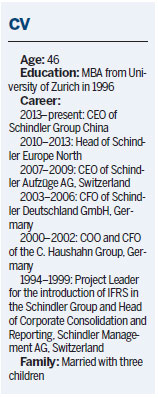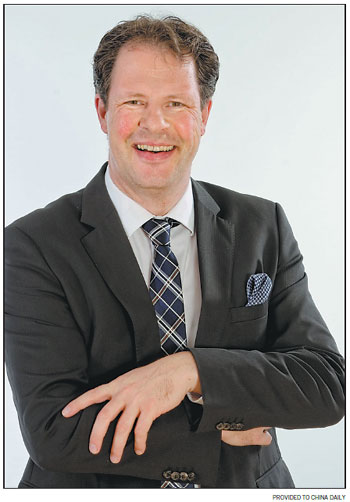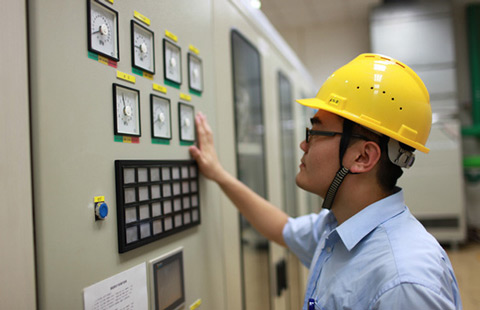Chinese market lifts Schindler to success
Updated: 2015-07-13 15:41
By Zhu Wenqian(China Daily USA)
|
|||||||||
Local talent to play key role in sustaining growth, says Thomas Oetterli, China head of Swiss elevator-maker
Thomas Oetterli, CEO of Schindler Group China, began his career with the leading Swiss elevator and escalator company in 1994 as an accountant.
"Usually accountants are very quiet and very serious," he said. But apparently, Oetterli is a cheerful and humorous person with an extremely amiable and down-to-earth disposition.
Oetterli heads the China operation of Schindler, which has a rich track record of over 141 years in the country and is headquartered in Lucerne, Switzerland. It has more than 10,000 employees in China, one-fifth of the global total, and the percentage is increasing.
"When I look at our growth plans for the future, which are far above the market rate, we will have close to 20,000 people in China in a few years," Oetterli said.
The elevator giant recently released an innovative technology to integrate the elevator management system with a smartphone app. With the pre-programmed app installed, residents, visitors and employees can freely enter their residential and office buildings and get directed to specific elevators and floors, without swiping cards or pushing buttons.
Thanks to the rapid rise of skyscrapers in China, Schindler saw 25 to 35 percent annual growth of its business in China in the past decade. The company has its second-largest research and development center based in Shanghai, and it is moving more and more R&D projects to China. Here Oetterli talks about the company's plans in China.
What are Schindler's competitive advantages vis-a-vis other elevator makers?
Five years ago, Schindler launched the innovative PORT technology, which seeks to provide intelligent and comfortable travel experiences for passengers. Users only have to tap their access card, pre-programmed with their identification and destination information, and the PORT takes care of the rest. The PORT technology calculates the most efficient route and sends an elevator to transport passengers to their destination in the fastest time possible.
Schindler has continued the innovation with the intelligent end-user application called myPORT, which fully exploits the potentials of the PORT system.
This is a solution that allows every resident to control, navigate and travel through their smartphones.
Any building occupant who has installed the myPORT app just needs to unlock their smartphone and show it to the myPORT reader to gain access.
The app myPORT is based on an e-banking-level system that meets the highest security standards. The system uses a combination of timing, building topology, and multiple data channels to ensure that the smartphone user really is authorized to access the building.
Occupants can use the myPORT app not only to open doors but also to order pre-programmed elevators, making it easier and faster for them and their visitors to move around the building. This can all take place without them taking the phone out of their pocket or bag, enhancing security while reducing wait times.
What has been your greatest achievement in China?
I can say that we have grown faster than the market, both in top line and bottom line. Top line means the sales and the bottom line refers to profit. Despite the success we have achieved, our appetite for growth is still strong. We would also like to play a major role in the market in the future.
Does Schindler plan to focus more on China and the Asia Pacific market?
Yes. There are two segments of our operations. The first is new equipment as depicted in the needs for new elevators or escalators while building a house or company. The second part of the business is the existing installed base. This involves maintaining an elevator, repairing it, or even modernizing it. Usually, if you look at the total top line, roughly 50 percent comes from new equipment and the rest from the services business.
In China, it is totally different. More than 90 percent is from new equipment. China is our biggest market and accounts for about two-thirds of the total business.
Will you hire more Chinese employees?
Of course. In fact, I have to admit it is a mistake that I am here. You should not have too many expats in an organization.
We don't have too many at the moment, but I always tell them: "Just imagine you are working in Europe and the whole management team is from China. How would you feel?"
Our global management executive board, of which I am a member, has just nine or 10 people and only two of them are from Switzerland. So I think we are very multinational. And I think the key objective in any country should be to have local people manning the top positions.
Do you plan to increase your research and development exposure in China?
Globally, we have several R&D centers. Today, the biggest one is in Switzerland. And by far, the second-biggest is in Shanghai. In terms of the number of people, Shanghai is quite close to the R&D headquarters in Switzerland.
In Shanghai, we are responsible for the worldwide escalator business and the whole top-range building business, and we are continuously scaling up. Our R&D capacities are increasing in China, because we have to be where the market is.
It cannot be that someone in Switzerland decides what is the right product for a residential building in China. This has to be done locally.
How fast did Schindler grow in China?
The China market has developed in the last 10 years, partly because of annual growth rates of 25 to 35 percent, whereas in Europe, we had this financial crisis in 2007, 2008 and 2009. Since then, the market is more or less flat. In some countries, it even declined.
It is interesting that Schindler was the very first foreign company to have a joint venture in China in 1980. We are the pioneers in China. In addition, Switzerland and China have a history of long friendship. Schindler also enjoys strong ties with the country.
What has been the major difference during your stints as the chief executive for various regions? Which one do you like the most?
When I came to China in early 2013, I was totally excited. For me, this was really positive. I have to say the market is really exciting and so is the country. I like the different cultures and food. I go to Guangdong province and enjoy the fresh food. Then I go to Sichuan and I am almost dying, because as a Swiss I am not used to spicy food.
This country is unbelievably fast. I came to Shanghai for the first time in 1998, that was 17 years ago, and the landscape of Pudong has changed dramatically since then. If it were not for the Pearl Tower, you would not recognize that you have already been here once. The Swiss mentality is to be a little slow and relaxed. We also want to be very thorough. So we are discussing, agreeing, then we are rethinking, reconsidering, and it can take years until we make a decision. Here, it takes months to make a skyscraper and about a year for a new highway.
This is absolutely amazing for me.
Is air pollution a problem for you?
Of course, these are issues that we do have in Shanghai and in Beijing, and there is room for improvement. I personally feel nothing. I have never had any health issues due to pollution. In the future, I am very sure that air pollution will be reduced because I think the government has brought in the right policies to control emissions from factories and reined mining industry.
I believe that the country is taking the right steps. And personally, I don't feel negatively affected.
I know others, they look at an app about the air pollution index everyday in the morning before they leave home. It is also a question of mindset. You can become psychologically disabled, just because you're focusing so much all day, at the end, you almost feel bad.
I have to say I also have an app, but I look at it maybe once a month, because I believe the more you think about negative aspects, the more you start to feel them. I am a positive man, much more forward-looking and interested in improvement.
What is your management style like?
My management style is also like that. When I try to explain how to lead an organization, I have a definition, it's performance-oriented and fun-cultured. At the end, fun is very important. If people do not enjoy work, or do not have fun at work, then it's a miserable life.
How do you spend your weekend amid your business schedule?
The first question is what is a weekend? We have to say we work very hard and hence do not have much free time. The number of weekends that I really have free are not as many as I sometimes would like. But when I do have time, I tend to spend it with my family.
Is your family based in China?
My family consists of my wife, two sons and a daughter. The older son is here and enjoys China. He has also worked here to gain experience. The others are in Europe.
At least once a month, I travel to Switzerland to attend our global meeting. I spend the whole week during that time with my family, when I am free. During the weekends, I try to be fully there for the family. When I'm here in Shanghai, I very often work on Saturday and partly on Sunday.
What are your hobbies?

In fact, there are two things. I like sport. In summer I like soccer, and in winter I like skiing. Here I tend to go to Changbaishan or to Harbin in the north, which is lots of fun. Besides sports, I like to read. If I cannot read a few pages everyday, 10, 20, 30 or sometimes even more, then I don't feel balanced in my life. So I need the time just to sit and read a book. I don't read management books. I like historical novels. I like to read about other periods and other cultures. And I like biographies. At the moment, I am reading the biography of Mao Zedong. Very interesting man. Reading and being outdoors for skiing and soccer. That's what I like.
Do you have a green lifestyle?
Yes, I think so. We regularly separate garbage, which is unusual here. In Europe we do it all the time.
My son and I have also bought two bicycles for cycling in Shanghai. I have to admit that sometimes the traffic is quite dangerous, but it is a lot of fun.
What is your impression of Chinese businessmen? And how do you break the ice when you first meet them?
Don't talk about business. I'm much more interested in the person, because I believe being interested in the person and his family creates a certain intimacy.
You cannot always expect that the other person will make the first step. So you should share something about your family, experiences, and private life.
I think it's not only in China, it's in general. When you meet someone, you should not just immediately talk about business or the next job, or the next order.
You have to build up a relationship. And this is only possible if you share personal thoughts.
zhuwenqian@chinadaily.com.cn

(China Daily USA 07/13/2015 page15)

 Beijing roasts in high temperature
Beijing roasts in high temperature
 The world in photos: July 6-12
The world in photos: July 6-12
 Djokovic downs Federer to win third Wimbledon crown
Djokovic downs Federer to win third Wimbledon crown
 Top 10 Chinese companies by profit margin in 2015
Top 10 Chinese companies by profit margin in 2015
 No room in the pool
No room in the pool
 Top gaokao scholars saddle up for a ride in the park
Top gaokao scholars saddle up for a ride in the park
 Girl who shoots straight with bow and arrow
Girl who shoots straight with bow and arrow
 Ten photos you don't wanna miss - July 10
Ten photos you don't wanna miss - July 10
Most Viewed
Editor's Picks

|

|

|

|

|

|
Today's Top News
Mexico: Drug lord 'El Chapo' Guzman escapes, manhunt begins
Lawyers held for 'trying to influence verdicts'
Top court official under inquiry for graft
It is wrong to label illegal immigrants refugees: Opinion
Leaders agree on partnership blueprint
New Development Bank launched in Ufa
IMF keeps 6.8% China growth view
Leaders agree on partnership blueprint
US Weekly

|

|







